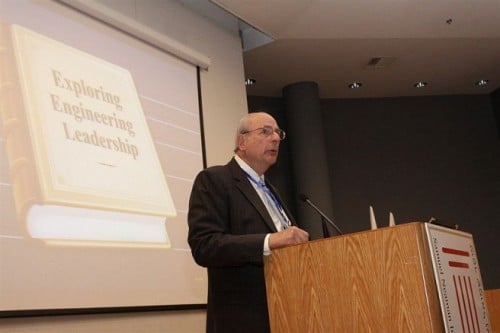Augustin was the main lecturer at the Israeli Conference on Systems Engineering that took place at the Technion last week. He also addressed the glitches in the space program

"Systems engineering is a relatively new field, which is designed to ensure first and foremost that failure of components of large systems does not cause damage to the entire system. " So said Norman Augustin, former CEO of Lockheed Martin who was the keynote speaker at a systems engineering seminar held at a loyal institution at the Technion and organized by Dr. Avigdor Sonnenshein and Prof. Aviv Rosen, from the Gordon Center for Systems Engineering at the Technion.
In his lecture entitled "The role of the leader in the field of systems engineering" Augustine said that first and foremost it is important that the project be headed by a person who thinks in an unconventional way. He brought several examples of leaders of countries and successful business companies, but mainly told about the lessons he learned from engineering failures.
"A leader is a person who knows how to correctly judge people and has the ability to convince people that what they do is important" he said. "A leader needs to know how to think outside the box and see the whole picture and not just parts of it at a time. The best way to identify a leader is in challenging times, people are revealed in such times. There is a Swedish proverb that says that every ship has a good captain in calm waters, but the one who navigates in stormy waters is the leader."
According to Norman Augustin, another problem facing the system designers is that the systems are operated by humans who are sometimes unpredictable. He provided many examples of failures and in each of them there was a different cause of the disaster, such as the Titanic disaster where they did not think the ship was capable of sinking so they equipped it with only half of the necessary lifeboats. Among other things, he focused on the 1986 space shuttle Challenger disaster in which seven astronauts were killed after the shuttle exploded in mid-air shortly after launch due to a cracked gasket. It turns out that the junior engineers warned that there might be a problem, but the decision makers were based on partial information when they checked what the temperature was at the time of the launch only in cases where the seals cracked (like the one that caused the disaster) and, and did not see a correct picture because they did not examine launches where no malfunctions occurred.
"There is a problem with complex systems since they cannot be tested in advance in all scenarios, therefore complex systems need to be planned so that if a malfunction occurs in a few components, it will not cause the failure of the entire system," he emphasized. "I used the Challenger as an example of the system. The space program is a living laboratory for systems engineering, firstly because of the unforgiving nature of failures in this field and secondly because there is a great deal of data available. Due to the need for transparency, the space program is documented in its details and thus it can be analyzed."
Augustin chaired a committee that examined the future of the space program and submitted its recommendations in 2009 to US President Barack Obama. In response to the question, Augustine said: "The committee I chaired regarding the future of the space program proposed several alternatives. The problem was that there was no budget to carry them out. The problem is not technological but how much we are willing to invest in the space program. It is not worth starting a space program if there will not be money to operate it in the future and there is currently no budget."
Is there also a problem with the Russian space program? Will humanity be "grounded" now?
"We will be grounded for a while. We'd be grounded for millions of years, we could get by for a few more years without a manned space program. Anyway, China is developing a manned space program, the Russians will improve their program. Nevertheless, even now there are astronauts on the space station. As with everything, the space program has its ups and downs. I believe this is just preparation for the next step. As for the private space program - there is a private sector in the US that is interested in space and this is a promising thing. It will take some more time to plan. It is only important that the planning is done well. Space is an unforgiving environment and it would be tragic if private industry cut corners in order to save money. This will cause us a terrible retreat."
In the photo: Norman Augustin lectures at the conference. Photo: Yoav Bacher, Technion Spokesperson

One response
Amazing we didn't know that before
System engineering is a lot of bullshit
You just need good engineers with common sense and a lot of logic